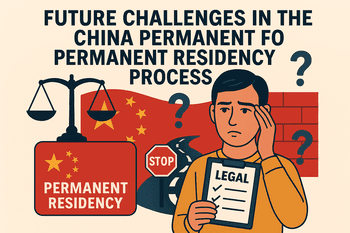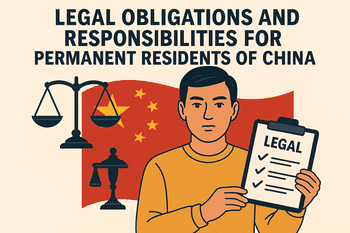
China’s $17.7 trillion economy presents unprecedented opportunities for foreign entrepreneurs, but navigating its complex legal landscape requires strategic planning and expert guidance.
With over 1.48 million foreign-invested enterprises operating in China as of 2023, the competition is fierce and the regulatory environment increasingly sophisticated.
This comprehensive guide examines current legal requirements, costs, and strategies for foreign entrepreneurs seeking reliable legal representation in China.
The Critical Importance of Legal Representation
Foreign entrepreneurs face unique challenges in China’s civil law system, where regulatory compliance can make or break business ventures.
Recent enforcement actions have resulted in penalties exceeding $50 billion annually for non-compliance, making professional legal counsel not just advisable but essential.
Key Areas Requiring Legal Expertise:
Business Formation & Regulatory Compliance
- Wholly Foreign-Owned Enterprise (WFOE) establishment
- Foreign Investment Law compliance (effective January 2020)
- Negative List adherence for restricted industries
Intellectual Property Protection
- China processed 7.36 million patent applications in 2023
- IP theft costs foreign companies an estimated $225-600 billion annually
- Trademark squatting remains a significant threat
Data Protection & Cybersecurity
- Personal Information Protection Law (PIPL) compliance since November 2021
- Data Security Law requirements for cross-border data transfers
- Cybersecurity Review measures for critical information infrastructure
Understanding China’s Evolving Legal Framework
Recent Regulatory Changes (2020-2024)
| Law/Regulation | Effective Date | Key Impact |
|---|---|---|
| Foreign Investment Law | January 1, 2020 | Replaced three previous foreign investment laws |
| Data Security Law | September 1, 2021 | Introduced data classification and protection requirements |
| Personal Information Protection Law | November 1, 2021 | China’s comprehensive privacy legislation |
| Revised Company Law | July 1, 2024 | Enhanced corporate governance requirements |
Current Business Environment Challenges
Geopolitical Tensions
- US-China trade tensions affecting technology transfers
- Entity List restrictions impacting 600+ Chinese companies
- Export control compliance for dual-use technologies
COVID-19 Impact
- Remote work regulations and digital business permits
- Enhanced health and safety compliance requirements
- Supply chain resilience and diversification mandates
Selecting Qualified Legal Representation
Essential Criteria for Legal Counsel Selection
| Criteria | Importance | Verification Method |
|---|---|---|
| China Bar Association License | Critical | Check official registry |
| Foreign Investment Experience | High | Review case studies and client testimonials |
| Sector-Specific Expertise | High | Verify industry knowledge and track record |
| Bilingual Capabilities | Medium-High | Conduct interviews in relevant languages |
| Government Relations | Medium | Assess regulatory interaction experience |
Recommended Legal Service Providers
International Law Firms with China Presence:
- Baker McKenzie – Strong in cross-border M&A and regulatory compliance
- Clifford Chance – Focus on financial services and capital markets
- Latham & Watkins – Technology and private equity specialization
Leading Chinese Firms with International Capabilities:
- King & Wood Mallesons – Merger with international firm, comprehensive services
- JunHe Law Offices – Strong government relations and regulatory expertise
- Zhong Lun Law Firm – Specialized in foreign investment and intellectual property
Source: Chambers Asia-Pacific Legal Directory 2024
Legal Challenges and Cost Analysis
Common Legal Challenges and Solutions
| Challenge | Frequency | Typical Cost (USD) | Resolution Timeline |
|---|---|---|---|
| WFOE Registration | 95% of new entrants | $15,000-30,000 | 3-6 months |
| IP Registration & Protection | 80% of tech companies | $5,000-25,000 | 6-18 months |
| Employment Contract Disputes | 60% of employers | $10,000-50,000 | 6-12 months |
| Tax Compliance Issues | 70% of businesses | $8,000-40,000 | 3-9 months |
| Contract Enforcement | 45% of B2B companies | $20,000-100,000 | 12-24 months |
Data compiled from China Business Law Journal and AmCham China surveys
Budget Planning Guide
Initial Setup Phase (Year 1):
- Legal due diligence: $10,000-25,000
- Business registration: $15,000-30,000
- IP protection: $10,000-20,000
- Total: $35,000-75,000
Ongoing Compliance (Annual):
- General legal counsel: $20,000-50,000
- Tax and accounting: $15,000-35,000
- Employment law: $5,000-15,000
- Total: $40,000-100,000
Current Market Insights and Trends
2024 Regulatory Priorities
According to the Ministry of Commerce’s latest guidance:
- Enhanced Foreign Investment Screening – New security review procedures for investments exceeding $50 million
- Carbon Neutrality Compliance – Mandatory ESG reporting for foreign companies with revenues over RMB 1 billion
- Supply Chain Security – Due diligence requirements for critical supply chain partners
Industry-Specific Considerations
Technology Sector:
- Enhanced scrutiny under National Security Law
- Mandatory data localization for sensitive personal information
- Cybersecurity review requirements for IPOs involving data
Manufacturing:
- Environmental compliance under revised Environmental Protection Law
- Worker safety regulations following recent industrial accidents
- Supply chain transparency requirements
Implementation Strategy
Phase 1: Pre-Entry Preparation (3-6 months)
- Legal Landscape Assessment
- Engage qualified legal counsel
- Conduct regulatory compliance audit
- Develop market entry strategy
- Risk Mitigation Planning
- Identify potential legal obstacles
- Develop contingency strategies
- Establish compliance monitoring systems
Phase 2: Market Entry (6-12 months)
- Business Entity Establishment
- Complete WFOE registration process
- Obtain necessary licenses and permits
- Implement corporate governance structure
- Operational Compliance
- Establish employment policies
- Implement data protection measures
- Set up tax and accounting systems
Phase 3: Ongoing Operations (Continuous)
- Regular Compliance Reviews
- Quarterly legal health checks
- Annual regulatory update briefings
- Ongoing government relations management
Red Flags and Warning Signs
Immediate Action Required:
- Government investigation notices
- IP infringement claims
- Employee complaints to labor bureaus
- Tax audit notifications
- Data protection violation allegations
Early Warning Indicators:
- Delayed permit renewals
- Unusual government inquiries
- Competitor legal challenges
- Employee turnover spikes
- Supply chain disruptions
Useful Resources and References
Official Government Resources
- Ministry of Commerce: english.mofcom.gov.cn
- State Administration for Market Regulation: samr.gov.cn
- China Law Translate: chinalawtranslate.com
Professional Organizations
- American Chamber of Commerce in China: amchamchina.org
- European Union Chamber of Commerce: europeanchamber.com.cn
- China International Chamber of Commerce: ccoic.cn
Legal Databases and Research
- Westlaw China: Comprehensive legal database
- China Law & Practice: Industry insights and analysis
- Asia Business Law Journal: Regulatory updates and case studies
Conclusion
Successfully establishing and operating a business in China requires sophisticated legal support that goes far beyond basic compliance.
The evolving regulatory landscape, geopolitical considerations, and increasing enforcement activities make professional legal representation not just advisable but essential for long-term success.
Foreign entrepreneurs should budget 2-5% of annual revenue for legal services and establish relationships with qualified counsel before entering the market.
The investment in proper legal representation typically pays for itself through avoided penalties, successful dispute resolution, and strategic advantages in the competitive Chinese market.
Key Takeaways:
- Engage legal counsel during pre-entry planning phase
- Budget $35,000-75,000 for initial legal setup
- Maintain ongoing legal relationships for compliance monitoring
- Stay informed about regulatory changes through professional associations
- Develop contingency plans for common legal challenges



